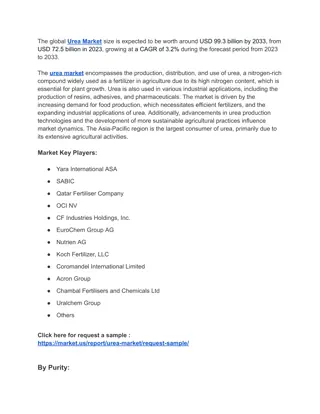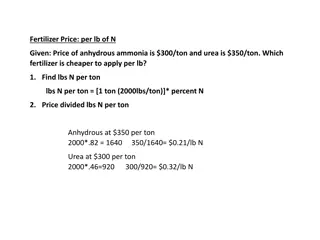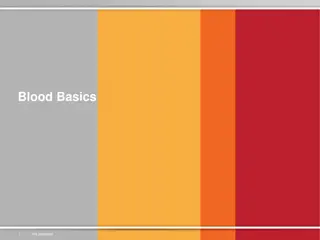Blood Urea
Urea is the main end product of protein metabolism, excreted in urine with varying levels in different conditions like dehydration, renal failure, and liver disease. Discover its normal values, physiological changes, and medications affecting blood urea levels.
Download Presentation

Please find below an Image/Link to download the presentation.
The content on the website is provided AS IS for your information and personal use only. It may not be sold, licensed, or shared on other websites without obtaining consent from the author.If you encounter any issues during the download, it is possible that the publisher has removed the file from their server.
You are allowed to download the files provided on this website for personal or commercial use, subject to the condition that they are used lawfully. All files are the property of their respective owners.
The content on the website is provided AS IS for your information and personal use only. It may not be sold, licensed, or shared on other websites without obtaining consent from the author.
E N D
Presentation Transcript
Blood Urea Presented By Assist.Lecturer Sarah Sameer Sami M.Sc. In Biochemistry/ Clinical laboratory sciences
What is urea? Urea is the main end product of protein metabolism. It is formed by removal of amino group from amino acids in liver and excreted in urine. Urea represents 50% of non protein nitrogen of normal blood.
Normal blood contains 15-40 mg/dl of urea In adults over 60 years it rises to 50 mg/dl During pregnancy it is 15-20 mg/dl Raised values are seen in dehydration In renal failure it rises up to 500 mg/dl In sever liver disease decreased blood urea is
Reference values: Newborns (< 10 days) : 6.4-53.5 mg/dl Adults (12-60 years) : 15-40 mg/dl Physiological: Increase: It occurs in normal people on high protein diet.
Decrease: In infants Pregnancy Low protein and high carbohydrates diet
Pathological: Increase: Excessive formation: increased protein catabolism in fever and sepsis.
Faulty excretion: Pre-renal failure: a low renal blood supply leads to reduced GFR ex: CHF Renal failure: damage to nephrons leads to decreased urine formation and excretion ex: nephritis Post-renal failure: urinary tract obstructions
Decrease: In transfusion of glucose solution due to dilution of body fluids and reduced protein catabolism What are medicines that increase blood urea? Amphotericin B Nafcilline Gentamicin Diuretics Corticosteroids























